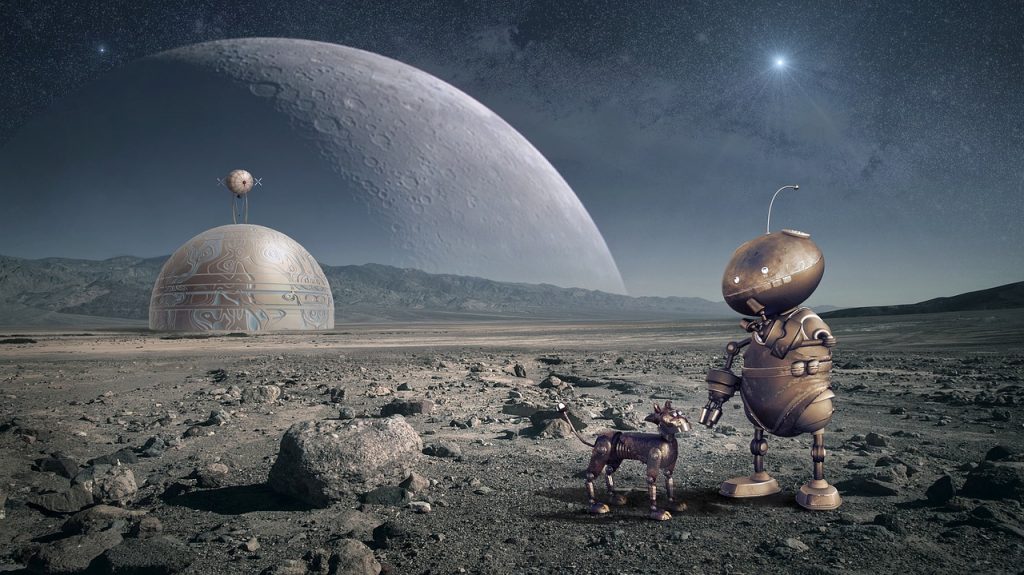While I do believe that you should read what interests you. At the same time, you want to make sure that you also try a variety of book genres, because you never know what might make an impression on you. If you are interested in technology advancements, the idea of the time machine or any other contraption, the impact of new inventions on the universe, unrealistic elements or events, and so on, then you too will enjoy science fiction!
Science fiction takes you out of this world and into another. It makes you look beyond where you are and wonder about new realities. Reading sci-fi has many advantages. There are even benefits to children who read sci-fi as well. In “How Reading Science Fiction Can Build Resilience in Kids,” Esther Jones explores recent research suggesting it can help children bounce back from adversity amongst other things.
Let’s take a look at 7 reasons why you should read science fiction today!

Here are the 7 Reasons Why You Should Read Science Fiction
1. Fun. Science fiction is fun. Sheer entertainment! Let’s face it, sci-fi is just a lot of fun to read. Escapism is the number one reason to read sci-fi. But the draw of science fiction is more nuanced than just a desire to escape the mundane.
2. Stimulates Imagination and Creativity. Science fiction encourages young children to think ahead and imagine more and better. This is especially true for young people living in a difficult, challenging environment. Science fiction offers insight, caution, and many new questions. Science fiction is frequently referred to as “the literature of ideas,” and it can imbue a “sense of wonder” or an increased sense of perspective and possibilities.
The real world has constraints, laws of physics, and nature that science must follow. Science fiction encourages imaginative thinking. More so than any other version of modern literature, science fiction allows us to break from our human limitations and tell stories that are impossible to tell in a real-world setting.
3. Promotes Problem Solving and Critical Thinking Skills. It proposes interesting problems, based on technology, social engineering, cultural changes, and encounters with alien beings that think and feel differently than we do. Science fiction promotes interest in science, encourages critical thinking skills, and shows us possibilities we might otherwise never see or even hear of.
4. Extrapolates current scientific knowledge. Plausible science opens the mind to creative thinking. Science Fiction extrapolates current scientific knowledge and helps to broaden the mind when assessing future scenarios for planning purposes. Tech giants like Google, Microsoft, and Apple have even employed Sci-Fi writers as consultants.
Sci-fi can lead to technological breakthroughs, like Arthur C. Clarke‘s geosynchronous satellite orbits (which is essential to telecommunication and GPS systems) or Arthur C. Clarke who is recognized for predicting geostationary telecommunications satellites back in 1945. His 1979 book The Fountains of Paradise even describes a space elevator. There are many other instances of real science coming from science fiction.

5. Promotes Social Awareness and Societal Advancements. Science fiction, perhaps more than any other modern genre of fiction, is often written with a social purpose or a goal. Sociological Sci-Fi makes you think and challenges your assumptions about what’s “normal” and what’s “right.” Fundamentally, science fiction prepares the reader for the inevitability of change.
Read Ray Bradbury, Octavia Butler, Ursula Le Guin. Many Sci-Fi authors explore discrimination, injustice, abuse of power, duty, obligation, and fidelity to society over oneself, and the effects of being diverse from the group they live within.
For example, in The Moon is a Harsh Mistress, Robert Heinlein, envisions the implications of a prison colony on the moon. He examines the economic and political implications of such a colony and in so doing, discusses the role rebellion played in the forming of the United States.
6. Expresses the Human Condition. Sci-Fi is a great medium to express the human condition, friendship, love, bigotry, or any other emotion that our race reacts to. Writers like Dan Simmons, Stephen Baxter, C.J. Cherryh are experts in exploring the human condition. After all, science fiction is not just tough guys and gals flying around in futurist toys. However, no matter how despairing your life is, science fiction promises that there will be a future… even in a post-apocalyptic world.
Science-Fiction writer, Ted Chiang once said, “To me, sci-fi is not about special effects or giant battles between forces of good and evil. Sci-fi is about using speculative scenarios as a lens to examine the human condition.”
7. Enhance Vocabulary. A Science Fiction lexicon is a rich vocabulary. Students struggle with scientific terminology because they don’t use the words in everyday conversation. That’s why there is an intrinsic benefit to learning words like cybernetics, cryogenics, extraterrestrial, sentient, antigravitational, terraforming, and many, many others.
A strong focus on vocabulary helps us understand and communicate using appropriate terminology, and helps make learning easier, and dare I say, fun. Having a good grasp of scientific terminology helps us clearly express our ideas and thoughts within the scientific community.

Science fiction is entertaining and thought-provoking, educational, and certainly mentally stimulating. It can shed light on current and potential future social issues.
Those, like myself, who are drawn to science fiction, which, while speculative, appreciate the nods to realism and thoughtful perspectives on the future– frequently one that is informed by scientific and technological realities.
In “Why Science Fiction is the Most important Genre,” Yuval Noah Harari, author of the best-selling books Sapiens and Homo Deus takes the claim a bit further. “Today science fiction is the most important artistic genre,” Harari says in Episode 325 of the Geek’s Guide to the Galaxy podcast. “It shapes the understanding of the public on things like artificial intelligence and biotechnology, which are likely to change our lives and society more than anything else in the coming decades.
In “7 Reasons Why You Should Read Science Fiction,” I covered many of the benefits of reading sci-fi such as enhanced imaginative skills, improved analytical skills, raised social awareness, and improved vocabulary. That’s right, reading science fiction will make you smarter! So, what are you waiting for? Whatever your interests or literary preferences, there’s a science fiction book out there for you!

Check out my book list for some YA science fiction and science fiction poetry to get you started.
